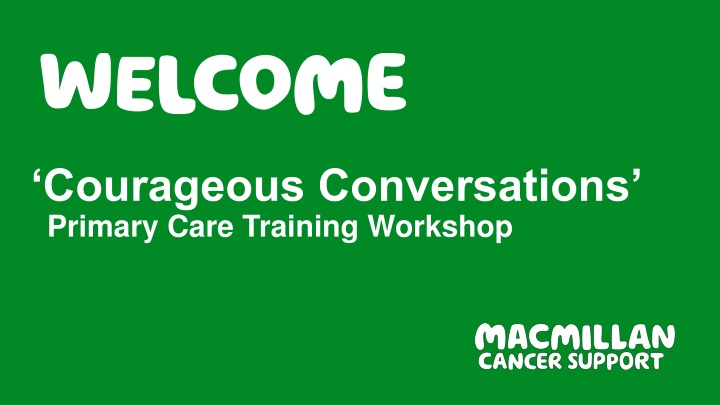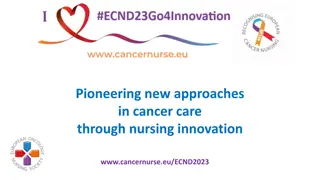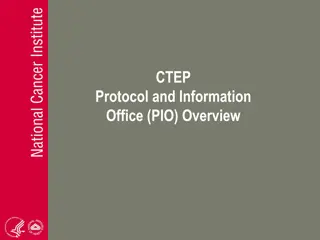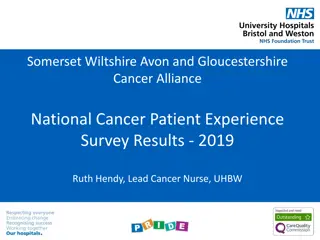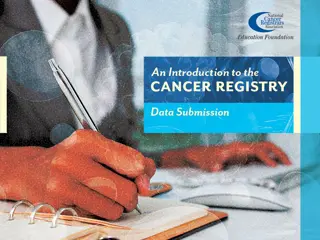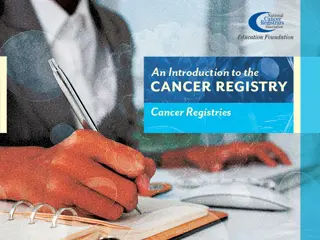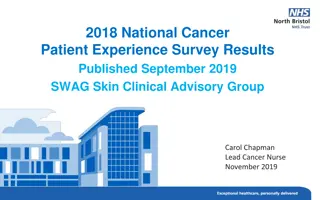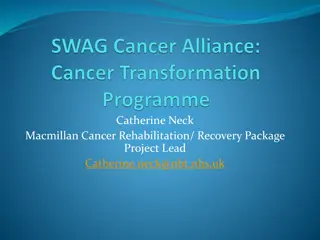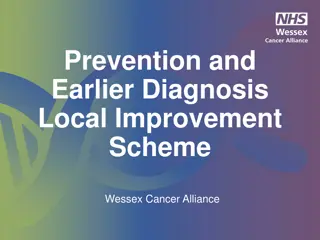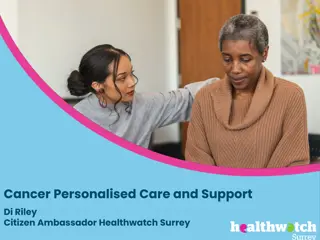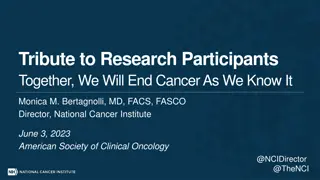Courageous Conversations Primary Care Training Workshop: Enhancing Communication Skills for Cancer Discussions
This workshop aims to equip Primary Care Professionals (PCPs) with the essential skills and confidence to engage in challenging conversations with individuals facing cancer, from diagnosis to end-of-life discussions. Recognizing the crucial role of health professionals in facilitating open dialogues and empowering patients to explore life choices, the workshop emphasizes the importance of effective communication to address concerns and uncertainties surrounding cancer diagnoses. By providing a platform for PCPs to enhance their abilities and engage in difficult conversations sensitively, the workshop seeks to improve patient support and care outcomes.
Download Presentation

Please find below an Image/Link to download the presentation.
The content on the website is provided AS IS for your information and personal use only. It may not be sold, licensed, or shared on other websites without obtaining consent from the author.If you encounter any issues during the download, it is possible that the publisher has removed the file from their server.
You are allowed to download the files provided on this website for personal or commercial use, subject to the condition that they are used lawfully. All files are the property of their respective owners.
The content on the website is provided AS IS for your information and personal use only. It may not be sold, licensed, or shared on other websites without obtaining consent from the author.
E N D
Presentation Transcript
Courageous Conversations Primary Care Training Workshop
Having challenging conversations with people about cancer and at the end of life
Workshop aims To support Primary Care Professionals (PCPs) to have conversations with people about cancer from diagnosis to discussions at the end of life To recognise the role health professionals play in helping people discuss cancer, empowering them to ask questions and helping them plan life choices To highlight that the skills needed to have these conversations well, as with all skills, need good quality and regular training
Implications for actions Good communicationis vital to make it easier for people to talk about a cancer diagnosis and their specific worries about the impact on their life and those around them including prognosis People are more likely to feel able to talk to health professionals they trust or know well As PCPs we need to have the skills and confidence to have these conversations, sometimes in difficult situations and without all the information we would ideally like to have
Causes of death England Causes of death England Cancer Circulatory system Stroke 27% 24% 6% Respiratory system Nervous system Other 14% 7% 28% Data on Mortality statistics - underlying cause for the year 2018 obtained from Nomis, the University of Durham, on behalf of the Office for National Statistics. Stroke is part of ICD10 I00-99 IX. Diseases of the circulatory system and it includes other I60-69 Cerebrovascular diseases.
Causes of death Wales Causes of death Wales Cancer Circulatory system Stroke 27% 25% 6% Respiratory system Nervous system Other 16% 5% 28% Data on Mortality statistics - underlying cause for the year 2018 obtained from Nomis, the University of Durham, on behalf of the Office for National Statistics. Stroke is part of ICD10 I00-99 IX. Diseases of the circulatory system and it includes other I60-69 Cerebrovascular diseases.
Causes of death Scotland Causes of death Scotland Cancer 28% Circulatory system Stroke 25% 6% Respiratory system 12% Nervous system 7% Other 28% Data on Deaths - Causes for the year 2018 from the Vital Events Reference Tables 2018 obtained from National Records of Scotland. Stroke is part of ICD10 I00-99 IX. Diseases of the circulatory system and it includes other I60-69 Cerebrovascular diseases.
Causes of death Northern Ireland Causes of death Northern Ireland Cancer Circulatory system Stroke 28% 24% 6% Respiratory system Nervous system Other 13% 7% 29% Data from Cause of Death 2017 Tables from the Registrar General Annual Report 2017 Cause of Death obtained from the Northern Ireland Statistics and Research Agency. Stroke is part of ICD10 I00-99 IX. Diseases of the circulatory system and it includes other I60-69 Cerebrovascular diseases.
Illness trajectories and palliative care Scott A Murry, Marilyn Kendall, Kirsty Boyd and Aziz Sheikh BMJ 2005;330;1007-1011 Doi:10.1136/bmj.330.7498.1007
Illness trajectories and palliative care Scott A Murry, Marilyn Kendall, Kirsty Boyd and Aziz Sheikh BMJ 2005;330;1007-1011 Doi:10.1136/bmj.330.7498.1007
The changing outcomes for People Living With Cancer (PLWC) The experience with cancer is unique to the individual The trajectory for people after a cancer diagnosis can be very different, even with the same tumour type This can leave PLWC with a lot of uncertainty Likewise, as PCPs, we can often have much uncertainty as to what someone should expect whether it be about treatment or prognosis As the cancer landscape changes, as PCPs, we may find ourselves needing to have different conversations with people about cancer
Cancer prevalence is changing challenging conversations may differ along the pathway Total Prevalence now Total Prevalence 2030 Maddams J, Utley M, Moller H. Projections of cancer prevalence in the United Kingdom, 2010-2040. Br J Cancer. 2012. 107: 1195-1202.
Three broad cancer groups McConnell, H. White, R. And Maher, J. 2015. Explaining the different complexity, intensity and longevity of broad clinical needs.
Challenging conversations about cancer can happen across the whole pathway Cancer fear people may avoid tests and appointments because they are worried about what will be found Urgent referrals communicating well regarding a referral can help ensure that people attend appointments Communicating a diagnosis mainly something done in secondary care but with new pathways, more direct access tests and advanced IT, we may increasingly find ourselves as the first person giving bad news about cancer Treatment decisions patients may want help from their PCP in making these decisions
Times of need Living with cancer and managing psychological effects anxiety, depression and fear of recurrence Treatable not curable cancer patients facing multiple courses of treatment and an unclear prognosis Decisions about palliative treatment helping PLWC make decisions about stopping or declining treatment End of life discussing changes in prognosis and likelihood that in last phase of life Advance Care Planning either early or late in the disease trajectory
What are the challenges? Lack of confidence in having difficult conversations Practical issues time Lack of training not having practised ways/phrases to enable the discussions Lack of information/knowledge and not being confident in having these conversations with uncertainty Worry about how someone might react
Who needs to be trained to have conversations about cancer and end of life care? PCPs GPs, Nurses, AHPs Community/District Nursing staff Heart failure/COPD/LTC nurses Community specialist palliative care team Hospital doctors - Palliative care - Other specialties
Times of need what might trigger a conversation Deteriorating despite optimally tolerated therapy Increasing functional dependence Progressive fatigue Recurring hospitalisations Emotional distress Carer exhaustion Patient request O Leary N et al. Eur J Heart Fail 2009, 11: 406-11
Why is it important for patients? Opening the conversation allows patients to: Explore options and discuss fears Identify wishes and preferences Decide on or refuse specific treatment Ask someone to speak on their behalf Appoint someone to make decisions for them using a Lasting Power of Attorney if appropriate Let people know their wishes giving them peace of mind
Some views It s not easy to talk about end of life issues but it s important to do. Now that we ve put our affairs in order and talked about what we want, we can put that in a box as it were, and get on with living one day at a time, cherishing each day together, as I know its going to end one day. It s normal it s going to happen to us all as some point! If you talk about dying, you can say everything you want and need to. There are no regrets If you talk about it, you can make the most of life.
Why dont we talk about dying and death?
Why dont we talk about dying and death? Individuals, family and friends, professionals and society are reluctant to discuss dying and death. Why? What are the advantages of avoidance? What are the disadvantages?
Communication principles and strategies
Important elements for a successful conversation The setting or environment is important not always flexible but can make the most of what we have Having a practised structure can be helpful Having the confidence and skills to ask about patients concerns and feelings. You can t guess what the concerns are you have to ask Important not to listen selectively for the concerns we can address - need to feel comfortable approaching issues that we might not immediately have answers/solutions for We should seek the patient s own solutions before we start to solve problems (Connelly et al 2010)
Behaviours and skills that can help a conversation be effective Non-verbal Being attentive Eye contact Nodding Looking concerned Leaving space for patient to talk
Behaviours and skills that show we are listening Verbal behaviours Open questions Picking up and responding to cues verbal and non- verbal Questions about feelings Clarifying Summarising and reflecting back to check our understanding Empathy Educated guesses (Fallowfield et al 2014, Robertson 2005
Behaviours that block two-way communication and patient disclosure Closed questions Leading questions Multiple questions Ignoring cues Giving information too soon Giving reassurance too soon Normalising/minimizing concerns McGuire & Pitceathly 2002
A video simulated conversation Watch the consultation please concentrate on the communication aspects, try to pay less attention to the clinical issues. Note positive aspects and also missed opportunities to facilitate good and effective communication. (Make some notes) Be ready to discuss things that could have been done differently or better. Think of specific actions, words or phrases that might be used.
Video consultation 2 The consultation will now be re-run Are there improvements? Again note specific behaviours and language that are effective. How might the consultation be further improved?
An improved consultation Now we will re-run of the same consultation with a fellow facilitator Are there improvements? Again note specific behaviours and language that are effective. How might the consultation be further improved?
Skills practice Trying some strategies and phrases in a safe environment
Consultation skills practice (1) There will be feedback on the consultation Learner is the healthcare professional Observer manages the process Consultation Observer may stop part of the consultation at any time - don t let people get too stuck
Skills practice (2) Professional comments on strengths first Patient and observer comment on strengths Professional comments on challenges/difficulties Patient and observer comment on difficulties but only with suggestions of alternative strategies/form of words etc Professional has chance, if desired, to re-run consultation with alternative strategies and repeat feedback cycle
Observer role Manage the process and the time Guardian of the ground rules protect the learner from destructive criticism Stick to the Oxford rule of positives first, be willing to contribute if others can t see anything good! Ensure no criticism without suggestion of alternative maybe ask critic to demonstrate
You may wish to add a slide showing groups for the scenario role play
